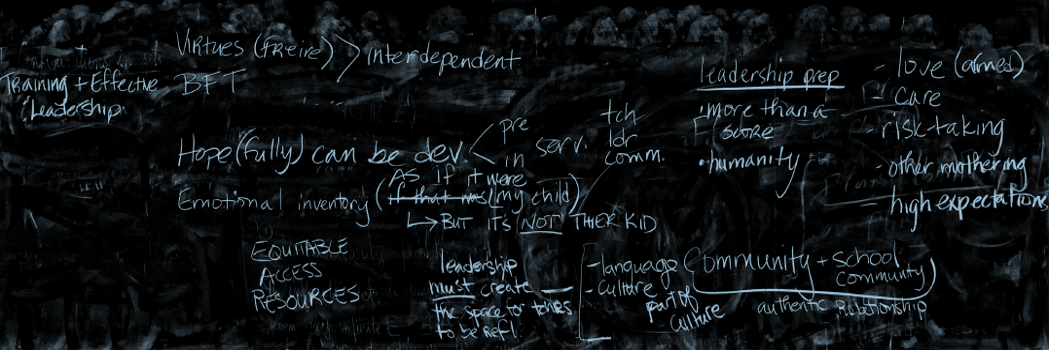In my career as a teacher, I have had four principals. When two of those principals walked into the room, it felt like dementors from Harry Potter. When one walked in, no one really noticed, except some stood up a little straighter. When my favorite walked in, the kids would run to him, proud of whatever they were working on. When I think back, I have often relied upon vague descriptions to convey how these leaders made me feel. I “trusted” or did not “trust” them. They seemed to “care” about the students or not. They were on the “side” of the teachers or saw teachers as their subordinates. They were committed to equitable practices or they were white supremacists. After reading this week’s readings and watching the video, I have begun to think about specific actions that these leaders took, both positive and negative to create a school culture.
The Khalifa reading stayed with me the most because the authors detailed specific practices that the school leaders enacted to create culturally responsive schools. Some that stood out included, “… uses school data and indicants to measure CRSL … uses parent/community voices to measure culturally responsiveness in schools… uses equity audits to measure student inclusiveness, policy, and practice… using culturally responsive assessment tools for students” (p. 1283 – 1284). These were concrete steps that these principals took to combine what Lomotey described as the bureaucrat/administrators and ethno-humanist sides of school leadership. The fact that data could be used for creating more equity and CR practices is so far from what I see on a day-to-day basis, that I had to take note. It is the rare principal who uses data to support those whom educational structures are designed to combat. I was left wondering if we were still in segregated spaces, would the goals of education be more clear and would children be used as a scapegoat less often?
As many of the readings spoke about the effect of a principal on test scores, I also found myself thinking about measures of school success. So much of what defines a successful school to me is intangible. I have worked in many “good” schools where students performed well on tests but teachers and students were miserable. I attributed our collective misery to the leadership of these schools, and I still do. I do believe that there is a connection between the tone of the school and the leadership of the principal, but I am not convinced that there is a direct correlation between the leadership of a principal and the academic performance of the students. In such an inequitable society, with such biased measures of performance, I am not convinced that a principal can always be counted on to do more than to change (important) but often unmeasured aspects of a school. Further, if we are constantly playing by their rules and using their definitions of success, how can we ever be free?




hi Kushya: I am so happy that you shared your professional experiences with four different principals and added your insights to this week’s readings. It is disheartening to read that only one out of the four provided a positive experience–but doesn’t that batting average call attention to the issues we read about in these four articles? Your experience also highlights the urgent need, cited by Khalifa and others, for radical reform of principal preparation programs, with explicit attention to prioritizing CSRL as much as, if not more than, other forms of leadership. Fondly, Jane
Hey Kushya,
You had me at “it felt like dementors from Harry Potter”. Have you considered the Patronus Charm? I hear its quite effective. When I read anything about testing and test scores I let out a big “Sigh” for the same reasons you mentioned (schools and measurements of success).
“if we are constantly playing by their rules and using their definitions of success, how can we ever be free?” I have two thoughts about this but mainly, the notion that the system will never fund its own destruction.
–